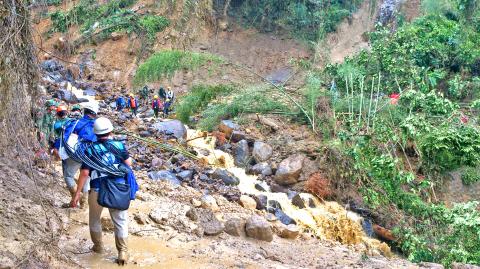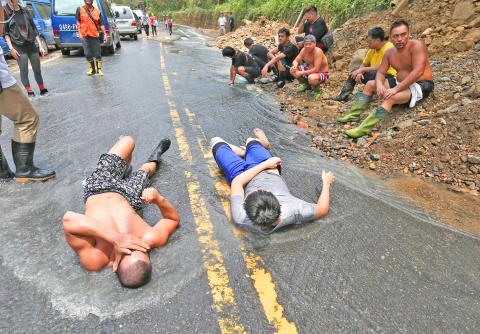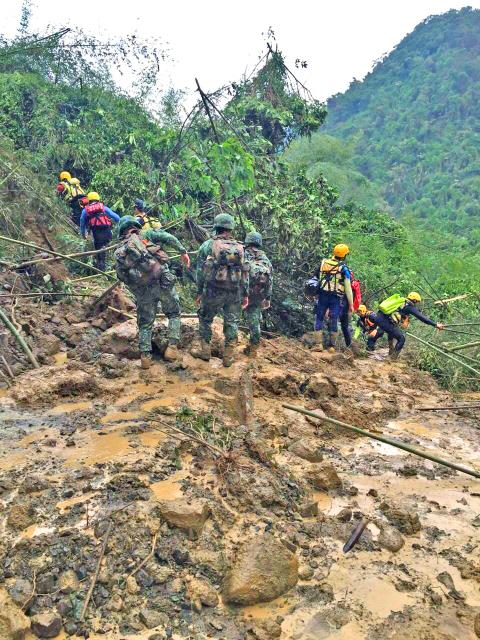Rescuers continued the search for residents of New Taipei City’s Wulai (烏來), Sindian (新店) and Sansia (三峽) districts who went missing after the nation was pummeled by Typhoon Soudelor on Friday and Saturday.
Known for its hot springs, Wulai suffered the most damage by the typhoon, with landslides cutting off the district’s only road access to the rest of the nation.
The emergency operation center in New Taipei City said that it had confirmed that 3,100 residents in Wulai were safe.

Photo: EPA / NEW TAIPEI CITY FIRE DEPARTMENT
About 2,000 Wulai residents were evacuated after the town was severely damaged by the typhoon.
According to the operation center, about 1,100 residents were reluctant to leave their homes because they wanted to clean up the mess left by the typhoon. Ample supplies allowed the residents to remain, the center added.
As of press time last night, the operation center said it was still searching for three missing people in Wulai, one in Sindian and another in Sansia.

Photo: CNA
The typhoon devastated the hotel industry in Wulai, with media reports saying that four famed hot-spring hotels in the town were completely wiped out by the storm.
Asked if they would resume operations there, some hotel owners said they would have to think about it because the hotels’ hot springs have all been reduced to pools of mud.
Others said that they can no longer stay there because the course of the river has changed and the riverbanks had been eroded heavily by the surging water.

Photo: Wu Jen-chieh, Taipei Times
Meanwhile, the Ministry of National Defense and National Search and Rescue Center continued to dispatch helicopters to bring supplies and rescuers to the disaster zone and evacuate people who are in need of medical attention.
Premier Mao Chi-kuo (毛治國) went to see the damage to the roads in Wulai yesterday afternoon and ordered that an emergency steel bridge be built at the 10.2km mark of Highway No. 9, where a massive landslide occurred, before the Mid-Autumn Festival holiday next month.
Mao also asked the Directorate General of Highways to repair part of Highway No. 9 so that large construction machinery and motor vehicles operated by rescuers could start entering the disaster zone.
The National Fire Agency was instructed to work with Chunghwa Telecom to bring small base stations to the Fushan (福山) area, to ensure uninterrupted communication with the Wulai District Office.
Aside from Wulai, strong winds brought by Soudelor also shattered the antenna cover at the weather radar station in Wufongshan (五分山) in New Taipei City’s Rueifang District (瑞芳).
The antenna cover was shaped like a globe and was one of the district’s most well-known landmarks. The cost of the cover topped NT$200 million (US$6.3 million).
According to the Central Weather Bureau, which owns the radar station, the cover was insured against damage caused by typhoons.

CHAOS: Iranians took to the streets playing celebratory music after reports of Khamenei’s death on Saturday, while mourners also gathered in Tehran yesterday Iranian Supreme Leader Ayatollah Ali Khamenei was killed in a major attack on Iran launched by Israel and the US, throwing the future of the Islamic republic into doubt and raising the risk of regional instability. Iranian state television and the state-run IRNA news agency announced the 86-year-old’s death early yesterday. US President Donald Trump said it gave Iranians their “greatest chance” to “take back” their country. The announcements came after a joint US and Israeli aerial bombardment that targeted Iranian military and governmental sites. Trump said the “heavy and pinpoint bombing” would continue through the week or as long

TRUST: The KMT said it respected the US’ timing and considerations, and hoped it would continue to honor its commitments to helping Taiwan bolster its defenses and deterrence US President Donald Trump is delaying a multibillion-dollar arms sale to Taiwan to ensure his visit to Beijing is successful, a New York Times report said. The weapons sales package has stalled in the US Department of State, the report said, citing US officials it did not identify. The White House has told agencies not to push forward ahead of Trump’s meeting with Chinese President Xi Jinping (習近平), it said. The two last month held a phone call to discuss trade and geopolitical flashpoints ahead of the summit. Xi raised the Taiwan issue and urged the US to handle arms sales to

State-run CPC Corp, Taiwan (CPC, 台灣中油) yesterday said that it had confirmed on Saturday night with its liquefied natural gas (LNG) and crude oil suppliers that shipments are proceeding as scheduled and that domestic supplies remain unaffected. The CPC yesterday announced the gasoline and diesel prices will rise by NT$0.2 and NT$0.4 per liter, respectively, starting Monday, citing Middle East tensions and blizzards in the eastern United States. CPC also iterated it has been reducing the proportion of crude oil imports from the Middle East and diversifying its supply sources in the past few years in response to geopolitical risks, expanding

Pro-democracy media tycoon Jimmy Lai’s (黎智英) fraud conviction and prison sentence were yesterday overturned by a Hong Kong court, in a surprise legal decision that comes soon after Lai was jailed for 20 years on a separate national security charge. Judges Jeremy Poon (潘兆初), Anthea Pang (彭寶琴) and Derek Pang (彭偉昌) said in the judgement that they allowed the appeal from Lai, and another defendant in the case, to proceed, as a lower court judge had “erred.” “The Court of Appeal gave them leave to appeal against their conviction, allowed their appeals, quashed the convictions and set aside the sentences,” the judges